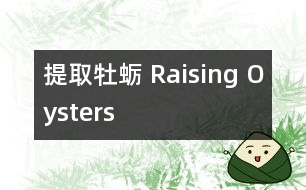提取牡蠣 Raising Oysters
時間:2009-01-31 12:19:12
提取牡蠣 Raising Oysters

推薦文章
- 節(jié)約型社會
- Flower of our motherland
- Plankton浮游生物
- 睡姿與性格-=Your Sleeping Position and Your Personality
- 文化交流
- 英語六級作文應(yīng)試指導(dǎo)
- 英語四六級作文五大模板(3)
- Travelling
- Advertisement on TV
- 傳統(tǒng)的價值觀(Traditional moral values)
- 我對承諾的看法(MY VIEW ON SO CALLED PROMISES)
- 2005年英語六級考試作文范文
- Happiness
- Mood
- 在海底栽果樹
- 大班語言活動:《小猴的出租車》
- 他不再尿褲子了(觀察記錄)
- 疏導(dǎo)孩子情緒的辦法
- 大班科學(xué)教案《鳥兒是我們的朋友》反思
- 小班數(shù)學(xué)教案《森林小衛(wèi)士》反思
- 繪本活動《跑跑鎮(zhèn)》中班教學(xué)設(shè)計反思
- 洗手液宣傳朋友圈文案35句
相關(guān)文章
- 英語課文 《Lesson19:WhatAreYouWearing?》教案
- 讀《Elaine,Mary lewis,and the Frog》一書有感
- 談?wù)剬懹⒄Z日記的好處-It is good to keep a diary in.
- 家鄉(xiāng)的變化-Great Changes in My Hometown
- Dont Let Card Collecting Affect Your Study-不要讓集卡影響你的學(xué)習(xí)
- 老師,原來你會笑-Teacher,I Thought You Couldnt Smile
- 我的寒假生活-My Happy Times During Winter Vacation
- 我的暑假生活-My Happy Time During the Summer Vacation
- 睡姿與性格-=Your Sleeping Position and Your Personality
- 從冰山獲取淡水 Obtaining Fresh water from icebergs
- The place of Science and Technology in Modern Life.
- 科技對學(xué)習(xí)的影響(The Effects of Technology on Learning)
- 看電影是不是比閱讀小說更愉快?(Is reading fiction more enjoyable than watching movies?)
- Responsibility and Learning